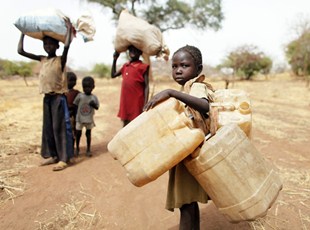UN in South Sudan seeks funds to support Sudanese refugees
June 14, 2012 (JUBA) – The office of the United Nations High Commissioner for Refugees (UNHCR) in South Sudan on Thursday appealed for donor support to scale up emergency response operations in Unity and Upper Nile states.

“Our capacity to respond to this emergency is being challenged every single day. We are anticipating a major scale-up to respond to the rapidly growing population of refugees from Sudan,” said Girard.
Since April 70,000 new arrivals have entered South Sudan.
According to the statement, 60,000 refugees were anticipated in Unity state yet with 50,000 already present and more coming at a rate of 800 per day, this number will have been reached by June.
In Upper Nile 75,000 refugees were expected yet there are already 105,000 and “up to 15,000 could cross the border in the coming days.”
Girard said that the UNHCR priority has been to resettle refugees in secure areas, away from the borderlands. However, she described the current settlements as “in remote areas with virtually no infrastructure.”
In order to supply the five such settlements, which have been established in Unity and Upper Nile states, the UNHCR has had to open new supply routes through neighbouring Ethiopia.
The World Food Programme (WFP) “reprioritised the allocation of food stocks at great cost to ensure that refugees were fed” according to Girard.
With the increasing population size of the settlements it is proving difficult to meet the demands of refugees in terms of basic services such as the water and sanitation. This has been of particular difficulty in Jammam settlement.
The UNHCR plans to establish new settlements close to the Nile in Upper Nile state and will airlift non-food items to the area “by mid-week.”
With the onset of rainy season, conditions are becoming more challenging. The UNHCR estimates that the cost of meeting the immediate needs of the refugees before the rains set in will be US$40 million.
An emergency appeal to raise US$111 million in funds for South Sudan has thus far reached only US$34 million, which has already been spent. To cover the shortfall the UNHCR used emergency reserves, which are now depleted.
Girard expressed her concern about the increased rate of arrival of refugees from South Kordofan and Blue Nile states who are citing bombings, ground fighting and the depletion of food stocks as reasons for their displacement.
“During my recent visit to Hofra, the refugees I met were weak from having survived on leaves and roots, and drinking untreated water from open sources as they travelled on foot for weeks to escape the conflict. Severe cases had to be hospitalized,” said Girard.
Due to poor road conditions tractors and trailers are being used to transport refugees from the border areas.
A group of 32,000 refugees were recently moved from Elfoj to Horfa and then to Kilo 18 in search of a sustainable water supply.
They are now being transported at a rate of 2,000 per day to Yusuf Batil where new boreholes are producing enough water to sustain 20,000 and more are being drilled.
Due to the risk of disease the sanitation facilities are also being upgraded.
There is urgency to drill new boreholes in the camps, including Yida where the water table “is good” as rainy season will make many of the roads unavigable.
The impending rainy season is also compelling the UNHCR and WFP to pre-position aid supply stockpiles which would otherwise have to be airlifted in the near future.
“We will continue to advocate for refugees to relocate to areas where the risk of attack is lower,” said Giriard in reference attacks on Yida camp.
An attack by the Sudan Armed Forces on the camp in November reportedly killed 12 people.
However, she gave assurance that the people in Yida will continue to receive assistance, “to maintain conditions of dignity.”
South Sudan is currently hosting over 150,000 refugees from Sudan.
(ST)
